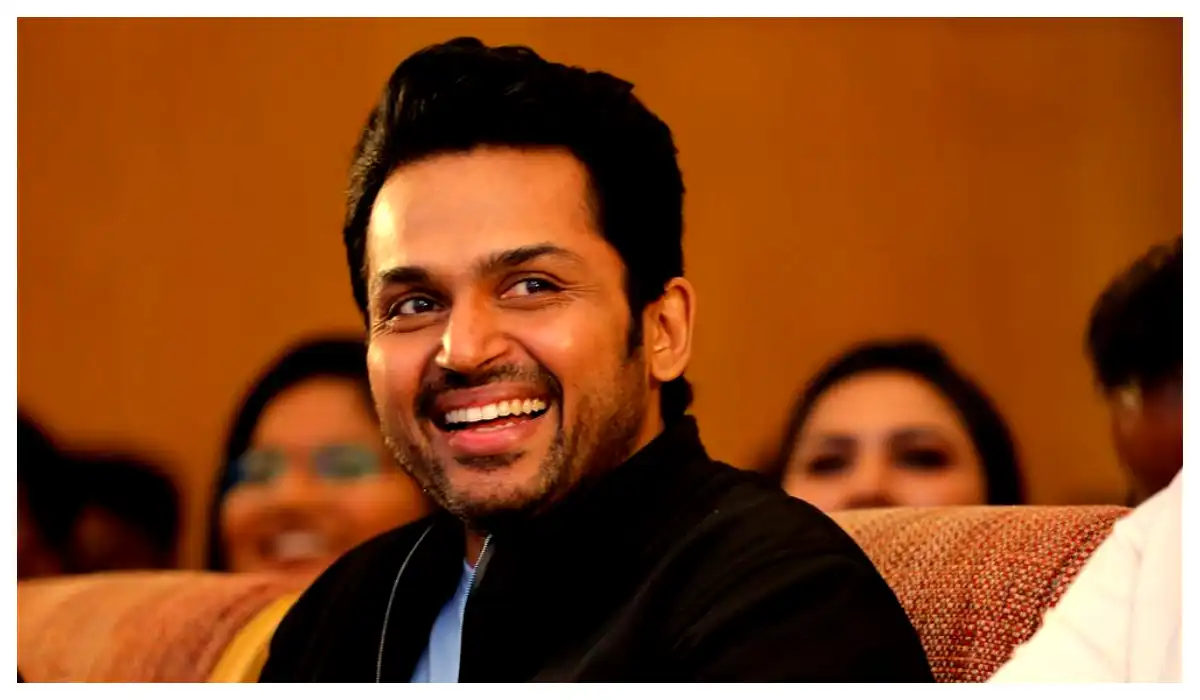It was incredible to work with Mani sir again: Karthi on Ponniyin Selvan, Kaithi 2 and the recently-released, Viruman
Interestingly, Rolex, played by Suriya in Vikram, was first offered to Karthi; he couldn’t take it up as he was busy with Ponniyin Selvan.
Aug 17, 2022

Karthi at the Viruman press meet
Karthi clarified in a press meet that there is no caste glorification in his latest release, Viruman, which was bankrolled by his brother Suriya's 2D Productions. "No caste is glorified or degraded in our film. It's a heartfelt rural project made with a lot of love. If people question and get into the origins of the idols and temples depicted in the film, none of the directors will be able to create a project that is true to our culture." Directed by Muthaiya, Viruman features Aditi Shankar, Rajkiran, Prakash Raj, Soori and Karunas, in key roles.
Karthi attributes Muthaiya's ability to capture rural life in his films with a sense of authenticity to the director's humble upbringing. His father used to run a tea shop in Madurai, where he met people from all walks of life on an everyday basis. "That is why I believe Muthaiya's films reflect reality."
Then, Karthi recalled the hurdles he went through before the release of Muthaiya's previous film. "People boycotted Komban before they saw it, as they felt it was a casteist piece of work. But, once it was released, everything was all right!"
The actor said he was indebted to filmmaker Ameer, who gave him a dream debut. "It was a huge hit," he re-emphasised.
Karthi revealed that director Ameer was concerned about this, which is why he set Paruthiveeran in the past. "Ameer wanted to make a good old rural drama, so he made certain that no modern advancements, such as cellphones or towers, were captured in the frame."
The actor enjoys working on rural films because he believes our roots are in villages. But, how's Viruman different from Komban? "From the outside, both are Madurai-based scripts, but the villages are different. So, the way people behave in these two parts is different!"
Making a rural film in a contemporary setting, according to Karthi, is a tightrope walk. "Villages have evolved, and their residents are as modern as those in major cities. As a result, a rural film must capture this evolution while preserving the uniqueness of the land and its people."
Karthi relates himself easily to rural characters because he used to spend his summer holidays in his hometown with relatives. "People there seem to be more relaxed. I had observed them, and that has stayed with me, and it shows in these films."
Karthi admitted not all of his films were hits. "I've witnessed enough failures. When I stepped back and examined my career, I realised there was room for me to reinvent myself. Thankfully, I found the other side of myself with Madras, Theeran Adhigaram Ondru, and Kaithi," he said.
While everyone is raving about Kamal Haasan's Vikram and director Lokesh's cinematic universe, it's worth remembering that Karthi was the one who gave the young director a big break with Kaithi. "I am overjoyed to see everyone appreciating Lokesh's effort. It feels like I won!"
Karthi is happy that Lokesh is broadening the universe. "I was blown away by how well our audiences understood the LCU elements and enjoyed the nuances. Kaithi 2 will be released soon," he added.
On being a part of Mani Ratnam's Ponniyin Selvan, he said, it was incredible to work with the director again, after Kaatru Veliyidai. "Ponniyin Selvan is not a fictional story; it happened in our history, though some elements are made up. Most of the characters, including mine, are real. We are very proud of the film and all of the characters. I wasn't the first choice to play Vandhiyathevan; many actors wanted the role, but I landed up in it."
The actor couldn't stop praising his mentor for his planning and execution. "Mani sir managed to complete filming for the two parts of Ponniyin Selvan in just 120 days. He was the first to be on the sets, and the last one to leave. No other director could have done this. He was able to anchor a huge star cast effortlessly!"
Karthi doesn't want to call Ponniyin Selvan, a pan-India project. "The franchise should travel around the globe in the same manner that the Cholas grew their kingdom and captured different parts of the world," he concluded.
Share